Featured Student: Elliott Evans
June 18, 2025
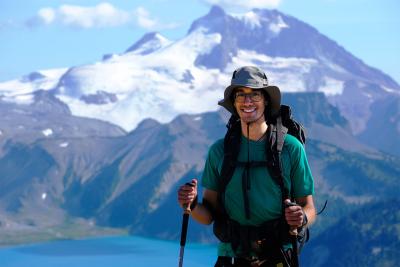
June 18, 2025

I am enrolled in a Bachelor of Science with a Major in Biology focusing on marine ecology. I expect to graduate in May 2025.
In addition to gaining relevant experience in my field, a big part of why I enrolled in Co-op was to learn what my options post-graduation would be like and what kind of work environment I’d do well in.I didn’t know which jobs were out there or how I could best tailor my degree to gain skills that might benefit me in a career outside of academia.
Co-op gave me a window into the possibilities for work in private industry, as well as the government sector, after graduating. This empowered me to pick courses that I thought would help me become a more well-rounded applicant.
Through Co-op, I gained valuable experience in a university lab, private industry and government, which helped me learn which aspects I liked and didn’t like about each.
I always imagined going straight into graduate school after my undergrad, but I’d never worked in a real lab or seen how they operated, so I wanted to experience that. Through Co-op, I gained valuable experience in a university lab, private industry and government, which helped me learn which aspects I liked and didn’t like about each.
I held three Co-op positions over 16 consecutive months.
I started as a research assistant with Dr. Mary O’Connor’s lab at UBC for 4 months – running my own pilot project with the Eelgrass Sea Hare, Phyllaplysia taylori – helping other lab members run their own experiments on marine species interactions and performing general lab maintenance tasks.
My second position was a 4-month placement as a Kelp Nursery Intern with the West Coast Kelp Ltd. in Bamfield, BC. I helped build out the company’s second kelp nursery, collected and induced spore releases in wild kelp, maintained juvenile kelps until they were ready for out-planting, helped test state-of-the-art seaweed bioreactors and assisted with kelp forest monitoring.
My third position was an 8-month placement as a Research Assistant with the Marine Mammal Ecotoxicology Lab of Fisheries and Oceans Canada in West Vancouver, supervised by Dr. Tanya Brown. I helped with a monthlong exposure experiment involving Chinook Salmon and Rainbow Trout, collected river water samples for an ongoing project on the effects of tire compounds on Coho Salmon, dissected at least one hundred salmon heads for contaminant and stable isotope analysis, as well as set up and ran qPCR plates.
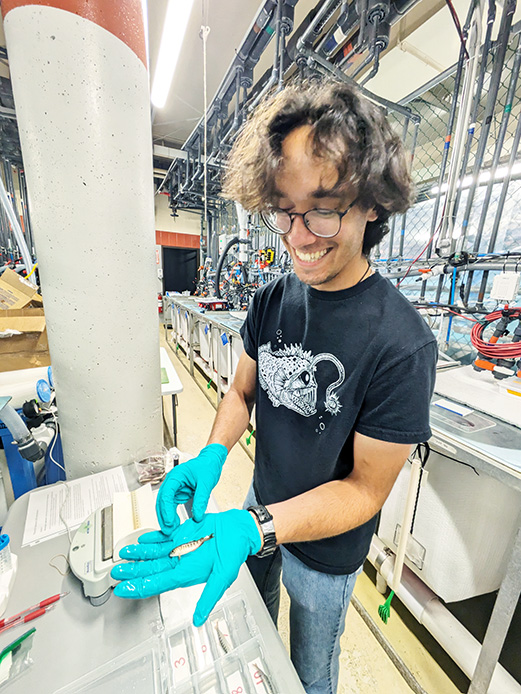
At Fisheries and Oceans Canada measuring the lengths and weights of juvenile salmon as part of an experiment measuring the effects of acute and chronic temperature stress.
At the O’Connor Lab, I had the privilege of helping Andrew Simon – a graduate student – investigate the occurrence of alpine lichens.
To study alpine lichens, one must go to alpine regions, so three of us from the lab packed our gear for a two-night trip in the Garibaldi Provincial Park near Squamish. We hiked for six hours, moving up steep and tricky terrain, with all our gear plus enough water to last the three of us for three days.
As we approached the summit, I was exhausted from the climb; my legs were tired, my shoulders and hips ached from the weight of my pack and my feet hurt. When we finally got to the top, one of the most beautiful views I’ve ever seen greeted us: the bald rock of the summit looked out onto the other peaks of the Coast Mountains and Howe Sound far below.
We spent the entire next day surveying lichens on the mountain and snacking on at least four kinds of wild blueberries. At the end of the day, we cooled off in a huge puddle left by summer rains. It was truly a memorable experience.
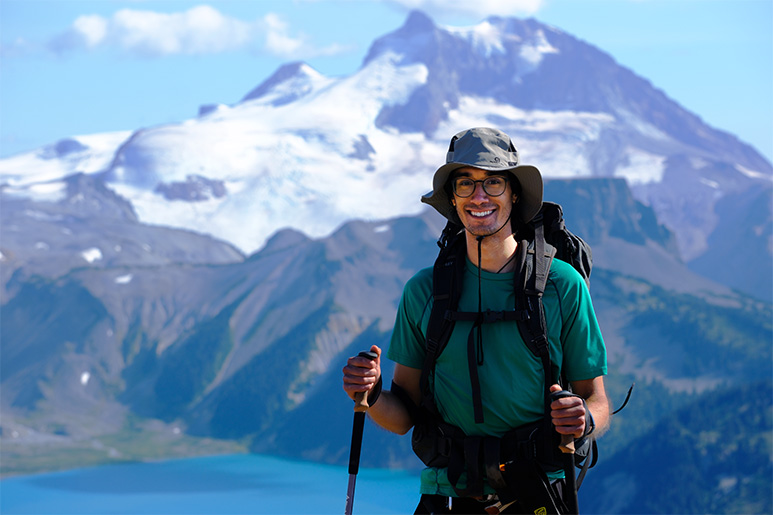
I wanted a variety of experiences working in academia, industry and government; I wanted to do meaningful things that would have a positive impact.
My best achievement was meeting the goals I’d set for myself before starting Co-op: I wanted a variety of experiences working in academia, industry and government; I wanted to do meaningful things that would have a positive impact.
I was very fortunate to find work in all three sectors that I had wanted to and I’m very grateful that I did, because it helped me see the pros and cons of each. Getting to experience different work settings helped me better understand what I wanted from a career and changed my mind about how soon I'll pursue a graduate degree.
I’m also very grateful that the work that I contributed to felt meaningful. With West Coast Kelp, I worked directly with First Nations Guardians on a kelp forest monitoring program and saw where the kelp I helped grow would get out-planted for restoration and small-scale kelp farming.
With Fisheries and Oceans Canada, the projects I helped with could be used to inform how fish stocks are managed and how we maintain the health of waterways. By the end of those terms, I felt I’d done something that could have a meaningful positive impact on the environment and on peoples’ livelihoods – and that was very rewarding.
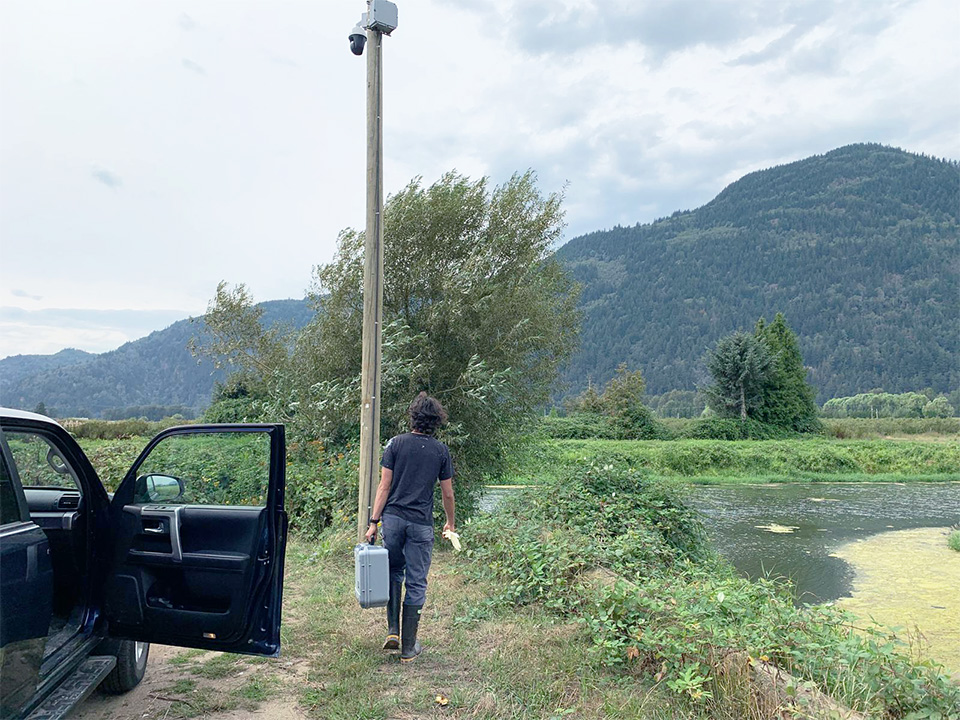
Setting up water quality monitoring equipment and collecting water samples for a pesticide runoff project on my placement with Fisheries and Oceans Canada.
Finding jobs that fit my main interest in marine ecology most challenged me.
The few posted to the Co-op job board usually only hired one applicant, so opportunities were competitive. Additionally, for my first term, I didn’t have any relevant experience, so I applied to more jobs than I expected and didn’t hear anything from most of them. It was disheartening, but I stuck it through and I’m glad I did.
After my first work term, I gained relevant experience and things got a lot easier. However, the number of job postings centred around marine ecology didn’t increase. That challenge remained, but I had the opportunity to branch out and consider other options. While I’ve always wanted to pursue work in the marine environment field, I took the opportunity and applied to postings that I wouldn’t have considered as relevant to what my studies, but turned out to have more overlap than I expected.
...during an interview with Agriculture and Agrifood Canada, the interviewer finished their questions and we spent the next twenty minutes just talking about how interested in fungi we both were. By not limiting myself to one interest, I greatly broadened the scope of the positions that I applied for and improved my chances of finding a job that would be a good fit for me.
In particular, during an interview with Agriculture and Agrifood Canada, the interviewer finished their questions and we spent the next twenty minutes just talking about how interested in fungi we both were. By not limiting myself to one interest, I greatly broadened the scope of the positions that I applied for and improved my chances of finding a job that would be a good fit for me.
Co-op massively helped my personal growth.
I had the privilege of moving for one of my Co-op terms and got to experience living by myself for the first time. I realised how much I enjoyed living in a small town, feeling a sense of community with my neighbours and being able to connect with the environment.
Co-op also gave me a lot of time with myself. Work differed from school, in that, when I clocked out at 5:00PM, my responsibilities for the day were done. There was no homework. I didn’t have that big assignment coming up that I should be working on. It liberated me from the pressures of intense academic terms. I started learning another language. I picked up the guitar. I bought a pair of binoculars and became obsessed with birds. I took a lot of time to connect with myself. At times, this was difficult, but I feel a much better sense of who I am and what my place in the world is now.
Co-op helped me in my career path in several ways. For one, I gained a lot of relevant experience and made valuable connections. The more experience I gained, the easier it became to find a placement in later terms and my connections helped me find some seasonal work right out of university.
I’m sure my experience and connections will continue to be immensely valuable later down the line as well. Co-op also made me rethink my original post-graduation plan, which I’m very grateful for. My original plan was to go straight into doing a Master’s after I graduate, but doing Co-op made me reconsider.
Through Co-op, I realised that there is so much more out there besides academia and while I suspect that I’ll come back to school to complete a Master’s degree some day, I realised that I’m not in a rush and that there’s a lot I can do with the knowledge and degree I already have.
The Science Co-op program’s resume and cover letter workshops best supported me.
Getting pointers on how to showcase my unique skills for employers made my applications stronger than they would have been otherwise and I’ve continued to use what I learned in my own job search.
Always be open to learning new things.
Learning new hard skills can be rewarding on a personal level (dissecting fish heads was quite satisfying) and can make you more valuable as an employee, both for the value of the new skill and because it demonstrates initiative.
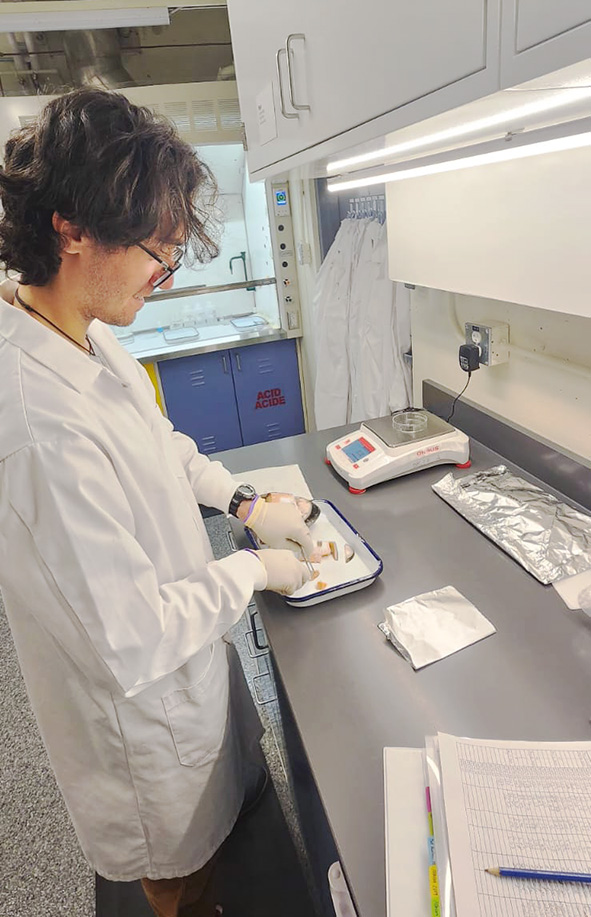
Working in Dr. Tanya Brown's Ecotoxicology Lab (Fisheries and Oceans Canada), where I dissected Chinook, coho, and chum salmon heads to collect muscle tissue samples and otoliths (a fish's inner ear bone).
Soft skills are also incredibly important, especially early in your career when you may not have as many hard skills and need to showcase other abilities. Communication and teamwork are particularly important; there are lots of ways that these can be improved in just about any work setting.
[Try] to learn about people; ask them where they’re from, how they got where they are, what they like to do for fun and who they are as a person. Everyone has a unique story and something to share. Making those connections makes your life so much richer.
I learned partway through my Co-op experience that learning about people also meant learning about myself. Being on Co-op terms gave me a lot of time to be with myself in a way that being a full-time student didn’t. Take advantage of those opportunities to learn about who you are, what your likes and dislikes are, as well as what kind of person you’d like to be.
Also, try to learn about people; ask them where they’re from, how they got where they are, what they like to do for fun and who they are as a person. Everyone has a unique story and something to share. Making those connections makes your life so much richer.
I learned partway through my Co-op experience that learning about people also meant learning about myself. Being on Co-op terms gave me a lot of time to be with myself in a way that being a full-time student didn’t. Take advantage of those opportunities to learn about who you are, what your likes and dislikes are, as well as what kind of person you’d like to be.
Lastly, remember that teachers are everywhere. Anyone above you in your work’s hierarchy has lots to teach you and so will your fellow Co-op students, co-workers, friends, family members, neighbours and any non-humans that have something to say (and believe me – they all do).
After graduation, I’m looking forward to working for the summer, then taking off to wander around places I’ve never been.
I can’t wait to meet new people, experience different cultures, and learn so so much.
We honour xwməθkwəy̓ əm (Musqueam) on whose ancestral, unceded territory UBC Vancouver is situated. UBC Science is committed to building meaningful relationships with Indigenous peoples so we can advance Reconciliation and ensure traditional ways of knowing enrich our teaching and research.
Learn more: Musqueam First Nation